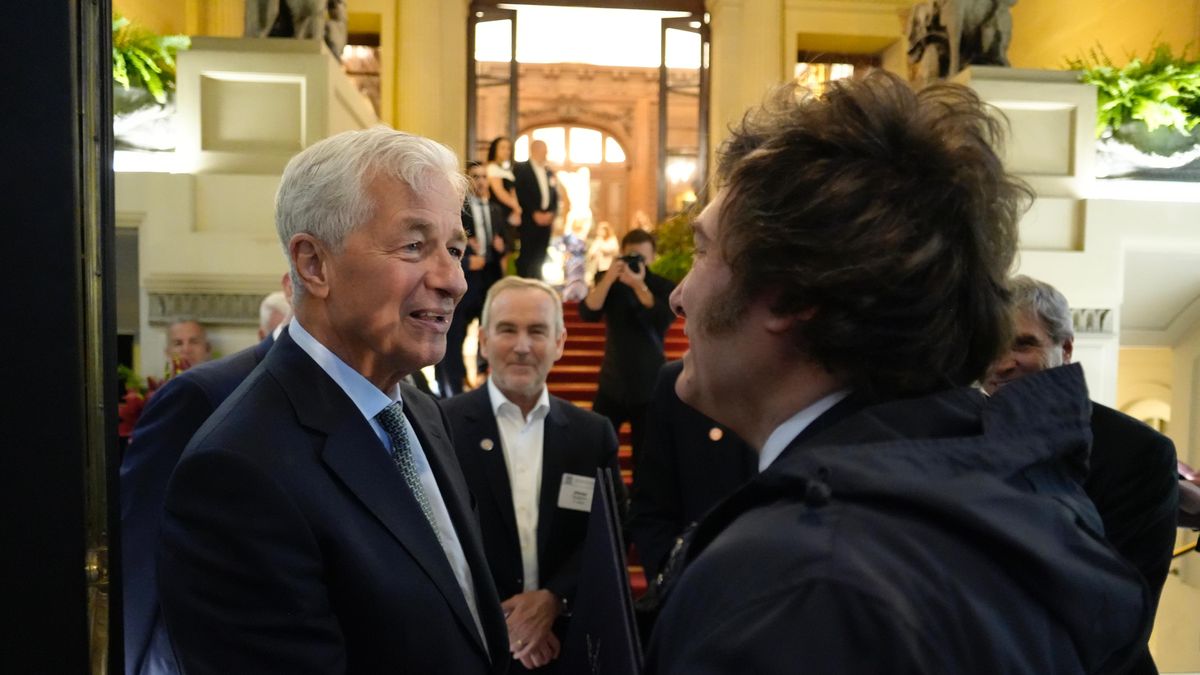“What happens is that there are people who have to choose between buying food or paying the rent,” Cleo, one of those in charge of organizing one of the kitchens of Bom Prato (Good Plate), the network of public kitchens that It has been operating since 2000 in the state of São Paulo, where you can have breakfast for 0.50 reais (13.66 pesos at the official exchange rate) and lunch or dinner for 1 real (27 pesos at the official exchange rate), by virtue of the provincial subsidy.
Bom Prato is a network of 94 public restaurants throughout the state of São Paulo that, since 2019, has been forced to expand its capacity by 40%.
In the old center of São Paulo, on the street of popular commerce 25 de Marzo, the lines begin, long and crowded even in the light rain, from 10:30. They are to eat a plate with rice, beans, salad, a fruit and a piece of meat.
Every Wednesday and Saturday, like this time, it’s the turn of the famous feijoada, a typical Brazilian food: a stew of black beans, pork, and sausages.
“I come every holy day,” he exclaimed in line to a question from Télam Robson Ribeiro, a beam transport specialist for the São Paulo city subway works. His work caused a disease in his hands and he was expelled from the labor market and now receives a minimal temporary pension from the INSS, the equivalent of the ANSES in Brazil.
Robson, 41, takes advantage of his going to the dining room line to sell Paçoquitas, a kind of peanut paste similar to Mantecol, and thus make a difference, collect the necessary reais to eat three times a day and be able to pay the pension. He lives very close, in a room located in what is now almost a small favela, an irregular occupation of the space between the old and dilapidated buildings of popular commerce mixed with people sleeping on the street.
At noon, in this dining room there is a line of 1,500 people to eat for one real. According to Cleo, there are no longer just people living on the streets, scavengers or aimless addicts. “Employees of all kinds come, because it is more and more expensive to eat,” she said.
The restaurant has 86 plastic chairs, distributed in tables for four people. There is a water dispenser that everyone can use in plastic cups. After lunch, each diner cleans their plate in a large waste bin: throw the plastic cup and paper napkin in another and leave the tray with the empty plate and cutlery on a counter.
It looks like a pilgrimage.
According to the network of entities Penssan, in Brazil there are 33 million people who suffer from hunger, that is, they do not know if they are going to eat when they wake up, and another 115 million with some type of food insecurity, that is, they have some type of obstacle in the budget to acquire the necessary food.
The Government of Jair Bolsonaro has expanded from August to the end of the year the emergency aid, a social plan that went from 400 reais (76 dollars) to 600 reais (114 dollars).
Iago is 25 years old, lives in the main square of downtown São Paulo, in front of the Sé Cathedral, in a tent. He is part of the 45,000 homeless people who live on the streets of the largest South American city, according to the Pastoral Care of the People of the Street of the Catholic Church.
“I come to eat here every time my stomach hurts and I can’t stand my hunger anymore. But I come almost every day, sometimes I make do with some bread that friends give me, but if I have the real one to come, I come. I wash a windshield on a corner and they give me the real to eat. I do paperwork for some businesses and with what I earn, I eat,” said the young man.
Before the pandemic Iago worked in a store, but became unemployed, living in a favela with his wife and daughter in Grajaú, a neighborhood on the southern outskirts of the metropolis.
The woman, the young man recalled, kicked him out of the house because everything she had was spent on so-called “synthetic marijuana” known as K2 or “spicy.” “It sucks but it’s hard to quit,” he added.
The feijoada plate is the only thing you will have for the day. If he can’t get a real at a traffic light, he will join other queues, from non-governmental organizations that distribute soup at night.
The Bom Prato program offers the homeless who register with the city administration the dish for free.
Few in line or inside the restaurant’s dining room want to talk about politics, about the October 2 elections, in which former president Luiz Inácio Lula da Silva (2003-2010), world famous for having implemented the Hunger Plan, appears as the favorite. Zero, ahead of the current president Bolsonaro.
In a country without parity or increase in the minimum wage since 2019 and unaccustomed to sudden inflation, the basic food basket increased by 23.5% in the accumulated 12 months, according to official figures from the IBGE.
Food inflation in general stood at 9.8% in August, while cumulative inflation in 12 months was 8.73%, more than double the Central Bank’s target.
In August and September, Bolsonaro achieved his goal of deflating the official index, especially due to the abrupt drop in taxes included in fuel prices.
The minimum salary is 1,212 reais, 230.70 dollars. 40 million receive it and more than 70% goes to the basic food basket, according to information from the Senate.
Danilo, 32, and Fábio, 48, work at a pulp company, are registered employees, and complain that inflation has advanced and wages have stagnated since 2019. Meanwhile, they wait to eat at Bom Prato.
“The problem is not that the salary does not increase every year as before, but that the salary is enough for fewer things, you have to look for other activities to make ends meet. So while we wait for things to change from the year who comes, it is convenient to come to eat for 1 real when in a little bar the executive dish does not cost less than 25 reals (683 pesos at the official exchange rate),” Fábio told Télam.
For him, “no one dies of hunger in São Paulo because there are more and more organizations distributing food.”
“I do see hunger,” said Danilo, who will vote for Lula in these elections. “In my neighborhood there are people who no longer cook with gas because they can’t buy the bottle.”
A few meters away, in line to eat feijoada, Ney Lopes da Silva, 52, told Télam that he was going to eat at the São Paulo government dining room for the first time and that his electoral option is Bolsonaro.
“I came to work downtown and the truth is that I don’t have enough to eat a plate in a bar or a restaurant. There are many problems to buy food and the only solution is the re-election of Bolsonaro. If Lula wins, he will mess with the price of food and there will be shortages,” said this seller of polyethylene bags who lives on the outskirts of São Paulo.
Created in 2000 in the administration of then-governor Geraldo Alckmin, today Lula’s vice candidate, Bom Prato is one of the public policies of the state of Sao Paulo defended by Rodrigo García, governor of the Brazilian Social Democracy Party, candidate for re-election. .
“This is a benchmark food security program in Brazil. There is no other like it, because São Paulo, crisis or no crisis, guarantees cheap access to food. It is a solution that must be accompanied by other programs for productive inclusion and income In times of crisis, it is essential as a platform for other rights,” São Paulo Secretary of Social Development, economist Laura Muller Machado, told Télam.
Some voices in Spanish break the silence of the restaurant. They belong to the mason’s assistant José Losada, a native of Táchira, and Gladys, from Caracas. Without a permanent job, they say they are thinking of returning to Venezuela. “Everything is very expensive, especially food and prices, now it’s convenient for us to go back,” said the immigrant.
Source: Ambito
David William is a talented author who has made a name for himself in the world of writing. He is a professional author who writes on a wide range of topics, from general interest to opinion news. David is currently working as a writer at 24 hours worlds where he brings his unique perspective and in-depth research to his articles, making them both informative and engaging.




